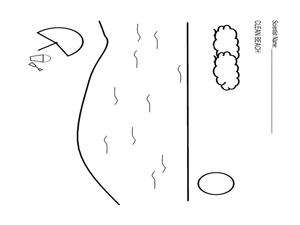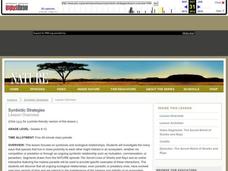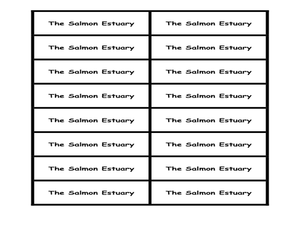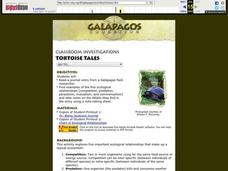Curated OER
What Is the Nature of Science?
Students distinguish between scientific and everyday meanings of key words-theory, hypothesis, law, fact-and use in context. They recognize the variables that affect observation, data collection, and interpretation. They discover the...
Centers for Disease Control and Prevention
Learning about Giardia and Giardiasis - Research and Role Play
Young biologists begin researching giardia and completing an epidemiologic triangle. They then portray either a parent of a sick child or a physician in a fun role play activity.
MENSA Education & Research Foundation
Ecosystems
Explore the Earth's different ecosystems through four lessons, an assessment, and extension activities. Lessons include informative text and step-by-step instructions to apply knowledge in interactive, and thought provoking ways; such as...
Curated OER
Oysters Are Habit Forming!
Students examine the relationships within a salt marsh habitat. In this habitat lesson, students examine the various kinds of symbiotic relationships in a salt marsh habitat.
Curated OER
Malaria Introduction
Learners analyze three different strategies for controlling the spread of malaria. They examine the disease and how people catch it. Students explore the life cycle of the malaria parasite.
Michigan Sea Grant
Sea Lamprey
Learners discuss the types of technology that are used to control the population of sea lamprey in the Great Lakes. They explain the parasite/host relationship and understand the devastating impact invasive species have on ecosystems....
Curated OER
Smallest Thing
Students compare characteristics of myobacteria and viruses to determine which is the smallest life form. They read and discuss an article that presents different viewpoints on the definition of life to determine their own viewpoint.
Children’s Hospital of Philadelphia
Understanding How Diseases Spread
To boost disease prevention, high schoolers arm themselves with information about infectious diseases and how they spread. Scholars research the causes, prevention techniques, and identify high-risk groups especially vulnerable to a...
Curated OER
The Cleaning Station
Students study cleaning stations. In this science lesson, students make a painting of a fish known as cleaners which take dead skin off of other fish.
Curated OER
Parasites: Our Tiny Companions
Students consider parasites that seek human hosts. They prepare nutrient agar plates and cultivate samples of bacteria taken from their own bodies. They experiment with disinfectants and soaps to determine which method kills the most...
Curated OER
Fish Hazards
Students study the Pacific salmon and see the different challenges they face. In this environment lesson students complete several activities that show how humans have affected the salmon environment. These activities have varying...
Curated OER
Symbiotic Strategies
High schoolers explore the different interspecies relationships namely mutualistic, commensal and parasitic. In this ecology lesson, students investigate an ecosystem disrupted by humans. They formulate an action plan to save it and...
Curated OER
Food Safety Unit Exam 1
Young scholars complete seventeen question test about food safety which includes matching vocabulary terms, short answer questions and fill in the blank questions. Test is part of the Food Safety Unit produced by the College of...
Curated OER
Science: Fish Behavior Bingo
Fifth graders, working in groups, observe fish in the Aquademics aquarium and identify the behaviors pictured there on worksheets. They match the pictures showing the behaviors, such as feeding, with the descriptions listed at the bottom...
Curated OER
The Salmon Estuary And Human Impacts
Learners have discussions and complete activities about the pacific salmon life cycle and marine parasites. In this salmon lesson plan, students complete activities such as observing sea lice, playing a tag game, and a board game.
Curated OER
The Living Environment
Students explore the cycles of an ecosystem. In this environmental science lesson, students work in groups to research the nitrogen cycle, the water cycle, or the oxygen-carbon dioxide cycle. Students prepare a PowerPoint or other...
Curated OER
The Disappearing Honeybees: Tracking Honeybee Decline
Young scholars practice graphing and other math skills to track number of honeybee colonies present in United States since 1978, discuss major crops that are dependent on insect pollinators, and examine reasons for decline of United...
Centers for Disease Control and Prevention
Teach Mrs. Jones' Class about Microbes
During a biology lesson, scholars research microbes, design a lesson plan using an outline, and present the lesson to the class.
Curated OER
Is There A Fungus Among Us?
Sixth graders classify fungus into two different groups. In this fungus lesson plan, 6th graders collect as many pieces of fungus as possible. Students then classify these pieces of fungus as saprophytic or parasitic.
Curated OER
Antigen Switching in Malaria
Learners model how the malaria-causing protist avoids immune response in its host. In this parasite biology lesson, students use printed cell images to model the way that Plasmodium changes surface protein markers every few generations...
Curated OER
Tortoise Tales
Learners read journal entry from a Gal??pagos field researcher, find examples of five ecological relationships (competition, predation, parasitism, mutualism, and commensalism) and take notes on the details they find in the entry using a...
Curated OER
Choose Your Defense: Spines, Vomit and Camouflage
Students investigate defensive mechanisms of insects and organisms. For this biology lesson, students draw imaginary caterpillars as well as imaginary parasites that will harm the caterpillar. Students utilize the Internet to discover...
Curated OER
Swell Homes
Students investigate galls. In this gall lesson, students inspect plants and locate galls present on leaves. Students collect galls from various plants and analyze the contents.
PBS
Symbiotic Strategies: The Secret Lives of Sharks and Rays
Learners investigate the interaction in an oceanic ecosystem. For this symbiotic relationship lesson, high schoolers investigate how ecological relationships evolve over long periods of time in order to maintain balance and stability of...

























